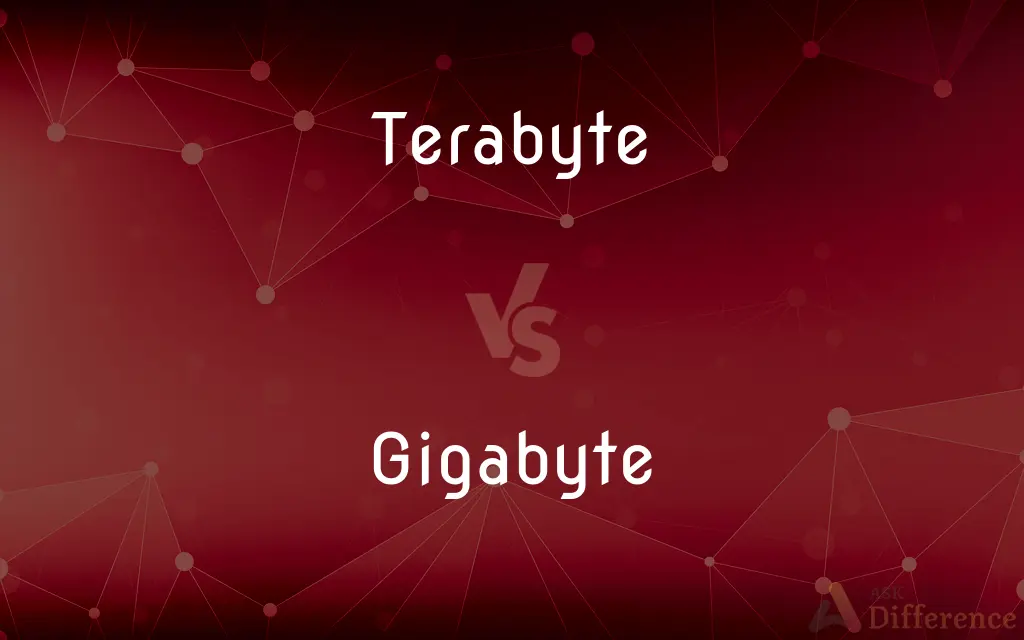Terabyte vs. Gigabyte — What's the Difference?
By Tayyaba Rehman & Maham Liaqat — Updated on March 3, 2024
A terabyte (TB) is a unit of digital storage that is approximately 1,000 times larger than a gigabyte (GB), which is used to quantify the capacity of storage devices and the size of files in the digital realm.

Difference Between Terabyte and Gigabyte
Table of Contents
ADVERTISEMENT
Key Differences
A gigabyte (GB) and a terabyte (TB) are both units of digital information storage, but they differ significantly in scale. One gigabyte is defined as 10^9 bytes (1,000,000,000 bytes), commonly used to measure the storage capacity of medium-sized storage devices like USB flash drives and the size of standard digital files such as videos and software applications. On the other hand, a terabyte represents 10^12 bytes (1,000,000,000,000 bytes), making it a much larger unit of measurement. Terabytes are used to quantify the storage capacity of larger devices, such as hard drives and servers, and to measure the size of extensive digital collections, including large databases, comprehensive digital media libraries, and the data generated by big data applications.
A gigabyte represents a substantial amount of data, enough to store hundreds of digital photographs or approximately an hour of standard-definition video. With the proliferation of high-definition video content, large-scale digital photography, and expansive software applications, the terabyte has become increasingly common in describing the storage needs of both individuals and organizations.
The transition from gigabytes to terabytes in storage devices reflects the rapid growth of digital data needs. While a gigabyte can comfortably hold a mix of digital documents, images, and short videos, a terabyte allows for the storage of entire digital libraries, including thousands of hours of video, extensive software suites, and vast collections of digital photographs. This difference highlights the evolution of digital technology and the increasing demand for larger storage solutions to manage and store the growing volume of digital content and data.
Understanding the difference between gigabytes and terabytes is essential for making informed decisions about purchasing storage media and managing digital files. For everyday users, a few terabytes in an external hard drive may be sufficient to backup personal data. In contrast, enterprises dealing with large-scale data processing and storage may require multiple terabytes or even petabytes of storage capacity, which is the next scale up, representing 1,000 terabytes.
While both gigabytes and terabytes measure digital storage, a terabyte offers vastly more storage capacity, suitable for extensive digital archives and professional data storage needs. As digital content continues to grow in size and complexity, the relevance of terabytes as a unit of storage measurement is expected to increase further.
ADVERTISEMENT
Comparison Chart
Size
10^9 bytes (1,000,000,000 bytes)
10^12 bytes (1,000,000,000,000 bytes)
Common Usage
Medium-sized files, USB flash drives
Large hard drives, digital media libraries
Data Storage
Hundreds of photos, hours of SD video
Thousands of hours of video, extensive databases
Relevance
Personal computing, smaller data needs
Large-scale data storage, professional use
Next Scale Up
Terabyte (1,000 GB)
Petabyte (1,000 TB)
Example
A 16 GB smartphone can store apps and media
A 2 TB hard drive can backup extensive digital collections
Compare with Definitions
Terabyte
Used for medium-sized digital files and devices.
A 32GB USB drive is suitable for transferring large files.
Gigabyte
Measures large storage capacities.
Modern computers may feature 1TB or more of storage space.
Terabyte
A unit of digital storage equal to 1,000,000,000 bytes.
A 500GB hard drive can store a library of digital books and music.
Gigabyte
Essential for extensive digital archives.
A server with 12TB of storage is used for business data backups.
Terabyte
Sufficient for basic computing needs.
A laptop with a 256GB SSD offers ample storage for most users.
Gigabyte
A unit of digital storage equal to 1,000,000,000,000 bytes.
A 4TB external hard drive can store a vast collection of high-definition videos.
Terabyte
Represents substantial data for personal use.
A 8GB file might be a high-definition movie.
Gigabyte
Represents professional-level storage needs.
A multimedia project might require several terabytes for raw footage.
Terabyte
Common in everyday digital life.
Many smartphone plans offer 10GB of data per month.
Gigabyte
Increasingly relevant with data growth.
Cloud storage services offer plans with multiple terabytes of space.
Terabyte
A unit of computer memory or data storage capacity equal to 1,024 gigabytes (240 bytes).
Gigabyte
The gigabyte () is a multiple of the unit byte for digital information. The prefix giga means 109 in the International System of Units (SI).
Terabyte
One trillion bytes. See Usage Note at gigabyte.
Gigabyte
A unit of information equal to one thousand million (10⁹) or, strictly, 2³⁰ bytes.
Terabyte
One trillion (1012, or 1,000,000,000,000) bytes or 1,000 gigabytes.
Gigabyte
A unit of computer memory or data storage capacity equal to 1,024 megabytes (230 bytes).
Terabyte
A tebibyte.
Gigabyte
One billion bytes.
Terabyte
A unit of information equal to a trillion (1,099,511,627,776) bytes or 1024 gigabytes
Gigabyte
(SI) 109, one billion (1,000,000,000) bytes. SI symbol: GB
Gigabyte
(computing) A gibibyte or 10243 (1,073,741,824) bytes.
Gigabyte
A unit of information equal to one billion (1,073,741,824) bytes or 1024 megabytes
Common Curiosities
What can I store in a gigabyte?
A gigabyte can store hundreds of digital photos, about an hour of standard-definition video, or several hundred digital books.
Do all computers now come with terabyte storage?
Many modern computers offer terabyte storage options, especially for users with high data storage needs.
How many gigabytes are in a terabyte?
There are 1,000 gigabytes in a terabyte.
Why would I need a terabyte of storage?
You might need a terabyte of storage for large digital collections, including thousands of hours of video, extensive software applications, or large databases.
How do I know if I need a gigabyte or terabyte of storage?
It depends on your data storage needs; terabytes are suitable for extensive digital archives, while gigabytes suffice for everyday personal computing.
Can I convert gigabytes to terabytes?
Yes, dividing the number of gigabytes by 1,000 will give you the equivalent amount in terabytes.
What is larger, a gigabyte or a terabyte?
A terabyte is significantly larger, approximately 1,000 times the size of a gigabyte.
Are there units larger than a terabyte?
Yes, the next larger unit is a petabyte, which is 1,000 terabytes, followed by exabyte, zettabyte, and yottabyte.
What's common for smartphones, gigabytes or terabytes?
Smartphones typically use gigabytes for internal storage, although high-end models may offer a terabyte option.
How has the need for terabytes emerged?
The growing size and quantity of digital content, such as high-definition videos and complex software, have driven the need for terabyte-scale storage.
Share Your Discovery

Previous Comparison
Werewolf vs. Weretiger
Next Comparison
Beat vs. OvercomeAuthor Spotlight
Written by
Tayyaba RehmanTayyaba Rehman is a distinguished writer, currently serving as a primary contributor to askdifference.com. As a researcher in semantics and etymology, Tayyaba's passion for the complexity of languages and their distinctions has found a perfect home on the platform. Tayyaba delves into the intricacies of language, distinguishing between commonly confused words and phrases, thereby providing clarity for readers worldwide.
Co-written by
Maham Liaqat













































